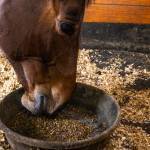Forage Extenders for Horses: Pros and Cons

Spring showers lead to lush pastures. With plentiful forage, it’s hard to imagine that the scorching sun of summer may lead to drought (green drought in Australia) and forage famine. In the event of a forage shortage, forage extenders could prove to be a valuable option.
“Forage extenders are high-fiber roughages designed to help replace a portion of the forage in the diet. They are typically pelleted. Because they often have minimal vitamin and mineral fortification, forage extenders usually have a higher recommended feeding rate than traditional concentrates,” said Kathleen Crandell, Ph.D., a nutritionist for Kentucky Equine Research.
Forage extenders are typically made from soy hulls, alfalfa and grass meal, wheat bran and wheat middlings, oat hulls, or a combination of these ingredients. “Forage extenders may also contain beet pulp, but beet pulp is an expensive ingredient and therefore not often used,” Crandell added. “Generally, forage extenders are more economical than typical concentrates.”
In addition to serving as a source of energy when forage is in short supply or when only poor-quality forage can be attained, consider other benefits of forage extenders, such as sustaining a healthy intestinal microbiome that contributes to normal digestion and overall health.
“Horses, particularly older horses, with poor dentition struggle to properly chew long-stemmed hay and do well on these small, easy-to-consume forage pellets,” explained Laura Petroski, B.V.M.S., a Kentucky Equine Research veterinarian.
In addition, horses predisposed to environmental allergies, such as dust or mold, or diagnosed with equine asthma (e.g., heaves) also tend to benefit from these forage pellets as it cuts down on their exposure to dust particles.
“When using these products, owners must realize that horses are naturally inclined to graze for most of the day. Thus, when a hay alternative is fed, which is consumed quickly in comparison to hay, it’s a good idea to give stalled horses an activity to keep them occupied when they otherwise would be grazing,” Petroski added.
Petroski recommended soaking extenders as some horses may choke on dry pellets if they are eaten too quickly, as with any other feedstuff.
“For assistance selecting and incorporating forage extenders into your horse’s diet, contact a Kentucky Equine Research nutrition advisor,” Crandell suggested. Topping off a forage-only diet with a well-rounded vitamin and mineral supplement, such as Micro-Max, will help ensure that all nutrient needs are met. In Australia, look for Gold Pellet, Nutrequin, or Perform to provide superior vitamin and mineral nutrition to horses fed forage-only diets.







